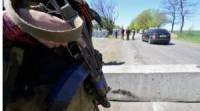Kremlin-backed militants continue ‘appropriating’ vehicles

Informator.lg.ua reports another incident when a Luhansk resident arrived to retrieve a car only to have it removed by militants from the self-proclaimed Luhansk people’s republic [LPR].
On Sept 12 the Luhansk resident returned to the city to collect a work car Skoda Fabia from the car park where she’d left it and take it to territory liberated from the militants.
She went to the car park on Lunacharsky St and presented her documents and was planning to drive away, but the guard stopped her since the car had Kyiv registration. A short time later LPR militants drove up and five armed men demanded that she hand over the keys and car papers.
The woman was told that the car was registered on ‘enemy territory’ and subject to confiscation. She was told she could pay for the two-month period the car had stood at the parking lot, but since the amount was substantial she was forced to simply hand over the keys, documents and the car to the militants.
On August 15 Informator.lg.ua cited local residents in reporting that at least 7 cars had been appropriated by the LPR militants.
Judging by another report from the same site, some of these cars may be taken to Russia to be sold.
The information above is posted under socio-economic rights and does indeed pertain to them. There are, however, other issues, including classification of such behaviour in the light of the insistence on a ‘political solution’ to the conflict in eastern Ukraine and the law on special status, passed in a secret vote in parliament on Sept 16. According to this law, areas now under the control of the LPR and analogous body in the Donetsk oblast, the self-proclaimed Donetsk people’s republic, will gain special status and considerable scope for self-government. The LPR, according to this law, will be able to hold local ‘elections’ on Nov 7. The bodies elected will in turn have a say in the appointment of prosecutors and judges, and will also be free to form ‘people’s militia units’. (more details here; What now? Donbas and Ukraine with the ‘special status law’)
Halya Coynash





